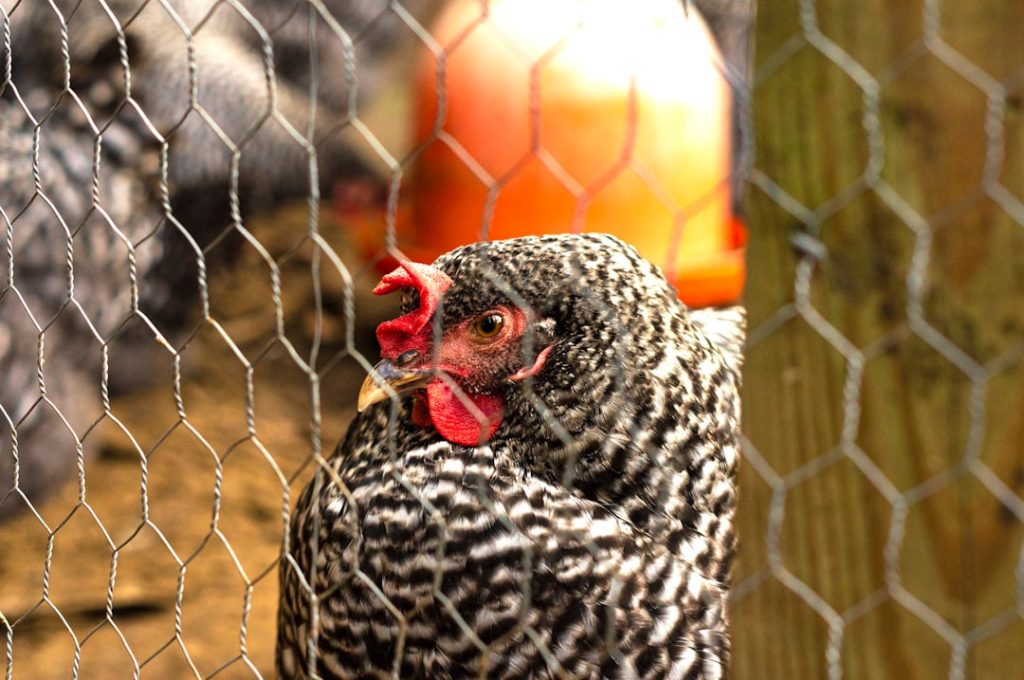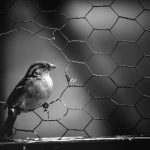Chickens are naturally curious and social animals with a strong instinct to scratch and forage for food. This behavior can lead to damage in gardens and landscaped areas. Understanding chicken behavior is essential for developing effective deterrent strategies.
Chickens are easily startled by sudden movements and loud noises, which can be utilized in deterrent methods. They also have a strong sense of hierarchy within their flock, which can be leveraged for positive reinforcement training. The natural scratching and pecking behavior of chickens is crucial for their survival in the wild but can become problematic in domestic settings.
By comprehending this instinct, we can implement strategies to redirect their foraging to more appropriate areas. Chickens’ social nature and flock mentality can be advantageous when training them and deterring them from unwanted areas. A thorough understanding of chicken behavior is fundamental to developing effective solutions for preventing damage to gardens and landscaping.
Table of Contents
- 1 Creating physical barriers
- 2 Using natural deterrents
- 3 Training chickens with positive reinforcement
- 4 Providing alternative areas for scratching and foraging
- 5 Utilizing scare tactics
- 6 Seeking professional advice
- 7 FAQs
- 7.1 What are some effective ways to keep chickens off flower beds?
- 7.2 Why is it important to keep chickens off flower beds?
- 7.3 Are there any plants that can deter chickens from entering flower beds?
- 7.4 Can I use chicken wire to keep chickens off flower beds?
- 7.5 How can I train my chickens to stay away from flower beds?
Key Takeaways
- Chickens are social animals and their behavior is influenced by their environment and interactions with other chickens.
- Physical barriers such as fences and netting can help keep chickens out of unwanted areas.
- Natural deterrents like citrus peels and strong-smelling herbs can discourage chickens from certain areas.
- Positive reinforcement training can be used to teach chickens to avoid certain areas or behaviors.
- Providing alternative areas with scratching posts and foraging boxes can redirect chickens’ natural behaviors away from unwanted areas.
- Scare tactics like motion-activated sprinklers or noise-making devices can startle chickens away from specific areas.
- Seeking professional advice from a veterinarian or animal behaviorist can provide personalized solutions for managing chicken behavior.
Creating physical barriers
Fences and Netting
This can include installing fences, netting, or other structures that prevent chickens from accessing the desired area. Fences should be tall enough to prevent chickens from flying over them and should be buried into the ground to prevent them from digging underneath.
Protecting Plants and Garden Beds
Netting can be used to cover specific plants or areas to prevent chickens from accessing them. Additionally, using chicken wire or mesh around garden beds can also be an effective physical barrier to keep chickens out.
Motion-Activated Sprinklers
Another physical barrier that can be effective in deterring chickens is the use of motion-activated sprinklers. These devices are triggered by movement and emit a sudden burst of water, startling the chickens and deterring them from entering the area. This can be an effective and humane way to prevent chickens from causing damage to gardens and landscaping.
Creating physical barriers is an important step in preventing chickens from accessing unwanted areas and causing damage. By implementing these barriers, we can effectively protect our gardens and landscaping from the natural foraging instincts of chickens.
Using natural deterrents

In addition to physical barriers, natural deterrents can also be effective in deterring chickens from specific areas. One natural deterrent is the use of strong-smelling plants or herbs that chickens find unappealing. Plants such as lavender, mint, or rosemary can be strategically planted around garden beds or landscaping to deter chickens from entering those areas.
Additionally, citrus peels or essential oils can also be used as natural deterrents, as chickens tend to avoid strong citrus scents. Another natural deterrent that can be effective in deterring chickens is the use of predator decoys. Placing decoys of natural predators such as owls or hawks in the garden or yard can create a sense of danger for the chickens, deterring them from entering the area.
Additionally, using reflective objects such as CDs or mirrors can create a visual deterrent for chickens, as they are easily startled by sudden movements or bright lights. Using natural deterrents is a humane and effective way to prevent chickens from causing damage to gardens and landscaping. By utilizing these natural methods, we can deter chickens from unwanted areas without causing harm to the animals.
Training chickens with positive reinforcement
Training chickens with positive reinforcement can be an effective way to influence their behavior and deter them from causing damage to gardens and landscaping. Chickens are highly social animals that respond well to positive reinforcement training methods. By using treats or rewards, we can encourage desirable behaviors and discourage unwanted behaviors in chickens.
For example, by rewarding chickens for staying within designated areas or for avoiding specific plants, we can train them to respect boundaries and avoid causing damage. Another positive reinforcement training method is the use of clicker training. This involves using a clicker to mark desired behaviors, followed by a reward such as treats or praise.
By consistently using this method, we can train chickens to associate specific behaviors with positive outcomes, effectively deterring them from causing damage to gardens and landscaping. Training chickens with positive reinforcement is a humane and effective way to influence their behavior and prevent them from accessing unwanted areas. By using these training methods, we can create a harmonious environment where chickens coexist peacefully with gardens and landscaping.
Providing alternative areas for scratching and foraging
One effective way to deter chickens from causing damage to gardens and landscaping is by providing alternative areas for scratching and foraging. By creating designated areas with loose soil or mulch where chickens are encouraged to scratch and forage, we can redirect their natural instincts away from garden beds and landscaping. This can be achieved by creating designated chicken runs or using portable fencing to create temporary foraging areas in different parts of the yard.
Another way to provide alternative areas for scratching and foraging is by incorporating chicken-friendly plants into the landscape. Plants such as clover, alfalfa, or sunflowers can be strategically planted in areas where chickens are allowed to roam freely. These plants not only provide a natural source of food for the chickens but also serve as a distraction from other garden plants and landscaping.
Providing alternative areas for scratching and foraging is an effective way to redirect the natural instincts of chickens and prevent them from causing damage to gardens and landscaping.
Utilizing scare tactics

Auditory Deterrents
One common scare tactic is the use of noise-making devices such as wind chimes or bells. The sudden sound of these devices can startle the chickens and deter them from entering specific areas. Additionally, using motion-activated sound devices that emit loud noises when triggered by movement can also be an effective scare tactic.
Visual Deterrents
Another scare tactic that can be used to deter chickens is the use of visual deterrents such as scarecrows or inflatable predators. These objects create a sense of danger for the chickens, deterring them from entering specific areas. Additionally, using brightly colored flags or ribbons that move with the wind can create a visual deterrent for chickens, as they are easily startled by sudden movements.
Effective and Humane Solution
Utilizing scare tactics is an effective way to prevent chickens from causing damage to gardens and landscaping without causing harm to the animals.
Seeking professional advice
If all else fails, seeking professional advice from a veterinarian or animal behaviorist can provide valuable insights into deterring chickens from unwanted areas. These professionals have the expertise and experience to assess the situation and provide tailored solutions for deterring chickens without causing harm to them. Additionally, they can offer guidance on implementing humane and effective deterrent strategies that align with ethical animal welfare practices.
Another professional resource that can provide valuable advice is a poultry specialist or agricultural extension agent. These professionals have extensive knowledge of chicken behavior and management practices and can offer practical solutions for deterring chickens from causing damage to gardens and landscaping. Seeking professional advice is a proactive approach to finding effective solutions for deterring chickens without causing harm to them or compromising the integrity of gardens and landscaping.
In conclusion, understanding the behavior of chickens is crucial in finding effective ways to deter them from unwanted areas. Creating physical barriers, using natural deterrents, training chickens with positive reinforcement, providing alternative areas for scratching and foraging, utilizing scare tactics, and seeking professional advice are all valuable strategies for preventing chickens from causing damage to gardens and landscaping. By implementing these strategies, we can create a harmonious environment where chickens coexist peacefully with gardens and landscaping while minimizing potential damage caused by their natural instincts.
If you’re looking for more tips on keeping chickens away from your flower beds, check out this article on building a farmhouse chicken coop. Creating a designated space for your chickens to roam and lay eggs can help prevent them from wandering into your garden and damaging your plants.
FAQs
What are some effective ways to keep chickens off flower beds?
Some effective ways to keep chickens off flower beds include using physical barriers such as fences or chicken wire, using natural deterrents such as citrus peels or coffee grounds, and training the chickens to stay away from the flower beds.
Why is it important to keep chickens off flower beds?
It is important to keep chickens off flower beds to protect the plants from being trampled, scratched, or eaten by the chickens. Additionally, chicken droppings can be harmful to certain plants and flowers.
Are there any plants that can deter chickens from entering flower beds?
Yes, there are certain plants that can deter chickens from entering flower beds, such as marigolds, lavender, and rosemary. These plants have strong scents that chickens tend to avoid.
Can I use chicken wire to keep chickens off flower beds?
Yes, chicken wire can be an effective way to keep chickens off flower beds. Simply create a barrier around the flower beds using chicken wire to prevent the chickens from accessing the area.
How can I train my chickens to stay away from flower beds?
You can train your chickens to stay away from flower beds by using positive reinforcement, such as offering treats when they stay away from the flower beds, and by consistently redirecting them away from the area when they approach it. Consistency is key in training chickens.
Meet Walter, the feathered-friend fanatic of Florida! Nestled in the sunshine state, Walter struts through life with his feathered companions, clucking his way to happiness. With a coop that’s fancier than a five-star hotel, he’s the Don Juan of the chicken world. When he’s not teaching his hens to do the cha-cha, you’ll find him in a heated debate with his prized rooster, Sir Clucks-a-Lot. Walter’s poultry passion is no yolk; he’s the sunny-side-up guy you never knew you needed in your flock of friends!







